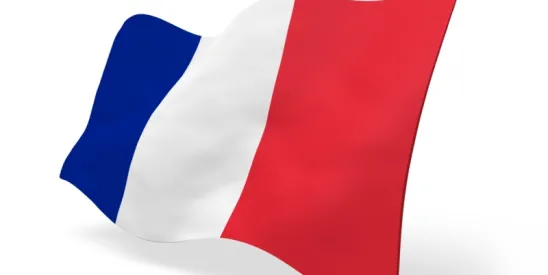The Action Plan for Business Growth and Transformation of Companies (PACTE) law, which was promulgated on 22 May 2019, includes provisions affecting several areas of French intellectual property law.
IN DEPTH
PATENT GRANT PROCEDURE
STRENGTHENING THE INPI GRANT PROCEDURE
One of the most important measures of the PACTE law regarding intellectual property is its extension of the scope of examination of patent applications by the French Industrial Property Office (Institut National de la Propriété Industrielle, or INPI), which comes into force on 22 May 2020.
Before the PACTE law, the INPI’s examination was limited to a high-level assessment of certain substantive grounds (i.e.,absence of patentability, lack of novelty). Such defects had to be “manifest” in the opinion of the examiner (e.g., for lack of novelty, a prior patent had to reflect strictly all the characteristics of the claimed invention). In addition, the criteria of inventive step and industrial application were not even considered. Because of this somewhat light examination, French patents may have been considered “weaker” patents than European patents or other national patents subject to more extensive verifications.
The PACTE law strengthens the INPI’s examination by allowing the INPI to reject a patent application for lack of novelty, lack of inventive step and/or lack of industrial application, among other things.
In practice, and because of these reinforced examination rules, it is likely that the INPI will grant fewer patents every year. However, these changes will provide stronger protection to the benefit of all patent owners seeking to enforce their patents in France.
INTRODUCING OPPOSITION PROCEEDINGS BEFORE THE INPI
After a thorough examination by the INPI before granting a patent, any third party with an interest will be able to question the validity of a granted patent via an opposition proceeding before the INPI. The conditions of this measure shall be implemented by a government ordinance within 15 months of the promulgation of the law (i.e., before the end of August 2020).
Currently, the invalidity of a French patent can only be challenged before French courts. This new procedure will make it possible to obtain either the amendment or the revocation of a French patent outside the courts.
This procedure aims to ensure the high quality and reliability of French patents (i.e., with a high presumption of validity), and should constitute a simpler, faster and less costly alternative to a judicial invalidation action.
UTILITY MODEL SYSTEM
The utility model (certificat d’utilité) is an industrial property title issued by the INPI that confers a monopoly on the exploitation of an invention for a maximum period of six years. With the PACTE law, this term has been extended to 10 years. The conditions of this change shall be determined by a decree to be issued no later than one year after the publication of the law (i.e., before the end of May 2020).
This change puts the French utility model on equal terms with most other European countries in which a utility model exists, and helps to make it a credible alternative to patents (even though utility models will remain less reliable than patents since they are not subject to a substantive examination and a prior rights search report).
Until now, only patent applications could be converted into utility model applications; the reverse was impossible. With the PACTE law, the conversion of a utility model into a patent application (which protects an invention for 20 years) will be possible.
STATUTE OF LIMITATIONS
INFRINGEMENT ACTIONS
As of 24 May 2019, the starting point of the statute of limitations for industrial property rights infringement actions (i.e.,patents, trade marks, designs and plant variety certificates) changed from “5 years from the facts that caused the action” (i.e., from the infringement acts) to “5 years from the day on which a right holder knew or should have known the last fact enabling him/her to exercise this right”.
Previously, an infringement action could only concern facts that had occurred no earlier than five years before the introduction of a court action. Older facts were automatically disregarded by courts.
According to parliamentary debates, this new wording is intended to make it possible to cover facts that began before this five-year deadline, but the wording is not as clear as expected, particularly due to use of the term “the last fact”. One can expect lively discussions before French courts on the starting point of this statute of limitations, including debate over identification of the last infringing fact, and when it should be considered that a right holder “should have known” about the last infringing fact.
The enforcement of this statute of limitations by French courts will have to be closely monitored. In any case, French judges should bear in mind that the positive objective of this new provision is to prevent counterfeiting and to improve compensation of right holders for the damage suffered therefrom.
INVALIDATION PROCEEDINGS
The PACTE law also provides that invalidation actions against industrial property titles (i.e., patents, trade marks, designs and plant variety certificates) are not time-barred. This provision came into force on 23 May 2019.
This absence of a statute of limitations applies to titles in force on the date of publication of the law, but will not affect final decisions having res judicata on that date.
The purpose of this provision is to put an end to the application by French courts, in the absence of a dedicated legal text, of a five-year statute of limitations starting “from the day on which a right holder knew or should have known the facts enabling him/her to exercise” an invalidation action, and to the numerous disputes and contradictory case-law regarding the starting point of this period (e.g., publication date or issuance date of a patent application, date on which the claimant knew the ground for invalidity).
This five-year statute of limitations also worked against the public interest by preventing third parties from obtaining the revocation of invalid intellectual property rights through a direct invalidation action, even if it was still possible to do so via a counterclaim as part of an infringement action, for example.
This change should be welcomed, as it clarifies the regime of invalidation actions.
IP OWNERSHIP RULES FOR PUBLIC INSTITUTIONS
Effective 24 May 2019, the PACTE law deleted a provision that forced any company that acquired a patent from a French public institution to restitute such patent if no commercial exploitation had started within five years of acquisition.
Companies will make a real asset deal with no threat of being forced to restitute the acquired patents to the French institutions in case commercial exploitation must be delayed or obtaining market authorisations takes longer than expected.
It will also prevent situations where French public institutions have to reimburse the acquisition price to companies and get back patents, never exploited, which lost five years of protection.
IMPLEMENTATION OF THE EU DIRECTIVE UNDER THE TRADEMARK REFORM PACKAGE
Finally, the PACTE law provides for a period of 12 months from its promulgation date (i.e., until end of May 2020) to implement by government ordinance the EU Directive 2015/2436 of the Trademark Reform Package.
The key measures provided by this directive and to be transposed into French law are as follows:
-
The elimination of the graphical representation requirement
-
The right to file oppositions before the INPI based on several prior rights
-
The right to file oppositions based not only on trade mark registrations or applications, but also on new prior rights, such as company names or reputed or well-known trade marks
-
The implementation of trade mark revocation and invalidation actions before the INPI





 />i
/>i
